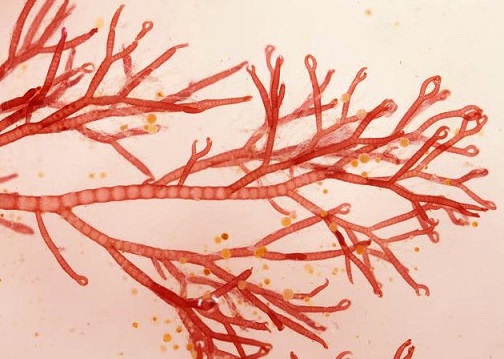Marine fungi could hold the key to new antiviral treatments for Monkeypox (Mpox)
Nikhil Prasad Fact checked by:Thailand Medical News Team Aug 18, 2024 1 year, 5 months, 2 weeks, 3 days, 10 hours, 48 minutes ago
Mpox News: Introduction to the Monkeypox Challenge
The ongoing threat of the Monkeypox virus (MPXV) continues to alarm health experts around the world, as there are still no specific antiviral treatments available. This virus, closely related to the one that causes smallpox, has shown its potential to cause outbreaks that could quickly spread across different regions. The need for effective antiviral agents has never been more urgent, particularly given the toxicity and poor effectiveness of some existing treatments.
 Marine fungi could hold the key to new antiviral treatments for Monkeypox (Mpox)
Marine fungi could hold the key to new antiviral treatments for Monkeypox (Mpox)
A team of researchers from King Abdulaziz University in Saudi Arabia, together with scientists from Saveetha University in India, have turned their focus towards a lesser-explored source for potential treatments: marine fungi. This
Mpox News delves into their groundbreaking study, which explores how compounds derived from marine fungi could serve as potent inhibitors against the Monkeypox virus by targeting a key viral protein known as VP39.
Understanding the Key Viral Protein: VP39
At the core of the Monkeypox virus's ability to replicate and evade the immune system lies the VP39 protein. This enzyme plays a critical role in modifying the virus's mRNA, a process essential for the virus to thrive and multiply. VP39’s function in stabilizing viral mRNA makes it an attractive target for antiviral drug development. By inhibiting this protein, researchers believe it’s possible to disrupt the virus’s life cycle, thereby reducing its ability to spread and cause illness.
The study focused on identifying compounds that could effectively inhibit the VP39 protein. The research team employed advanced computational methods, including virtual screening, molecular dynamics simulations, and free energy landscape analysis, to evaluate the potential of various compounds derived from marine fungi.
The Promise of Marine Fungi
Marine fungi, known for their ability to produce a wide range of bioactive compounds, are an untapped resource in the field of antiviral drug discovery. These organisms have adapted to survive in harsh marine environments, leading them to develop unique chemical compounds that could have significant medicinal properties.
In this study, the researchers screened a library of small molecule compounds derived from marine fungi. Out of thousands of candidates, four compounds stood out as particularly promising: CMNPD15724, CMNPD28811, CMNPD30883, and CMNPD18569. These compounds showed strong potential as inhibitors of the VP39 protein.
Rigorous Evaluation of Potential Inhibitors
The research team did not stop at virtual screening. They subjected these four compounds to a series of rigorous evaluations, including re-docking, molecular dynamics simulations, and hydrogen bond analysis, to assess their stability and binding affinity to the VP39 protein.
CMNPD15724 and CMNPD30883 emerged as the frontrunners, demo
nstrating superior binding affinity and stable interactions within the VP39 protein’s active site. This suggests that these compounds could effectively inhibit the protein, potentially overcoming some of the limitations associated with existing treatments, such as sinefungin, which has been known to cause significant side effects.
Detailed Molecular Insights
Molecular dynamics simulations provided deeper insights into the behavior of these compounds when bound to the VP39 protein. These simulations showed that CMNPD15724 and CMNPD30883 formed stable complexes with VP39, maintaining strong interactions throughout the simulation period. This stability is crucial, as it indicates that these compounds could effectively disrupt the virus’s replication process over an extended period.
Furthermore, the study’s use of Principal Component Analysis (PCA) and free energy landscape assessments revealed the dynamic nature of the interactions between these compounds and the VP39 protein. These analyses showed that CMNPD30883, in particular, maintained a highly stable conformation, suggesting it could be a particularly potent inhibitor.
Potential for Future Therapeutic Development
The findings from this study are not just theoretical. They represent a significant step forward in the search for effective treatments against Monkeypox. The four compounds identified - especially CMNPD15724 and CMNPD30883—hold great promise for further development and testing. These compounds could serve as the basis for new antiviral drugs that are both more effective and less toxic than current options.
Moreover, the study highlights the vast potential of marine fungi as a source of new antiviral agents. This untapped resource could lead to the discovery of other compounds with similar or even greater potential to combat not just Monkeypox, but other emerging viral threats as well.
Expanding the Horizon of Antiviral Research
This study is a testament to the importance of exploring diverse and often overlooked sources in the search for new treatments. Marine fungi, with their unique chemical diversity, offer a treasure trove of potential antiviral compounds that could revolutionize the way we approach viral infections.
As the world continues to grapple with the threat of emerging viruses like Monkeypox, the need for innovative and effective treatments is more urgent than ever. The research conducted by this international team of scientists opens new doors in the fight against viral infections and underscores the critical role that natural products can play in modern medicine.
Conclusion: A New Hope on the Horizon
The discovery of these potential inhibitors represents a beacon of hope in the ongoing battle against Monkeypox. By targeting the VP39 protein, these compounds could offer a new, more effective way to treat this virus, reducing its impact on global health.
The next steps involve experimental validation and clinical testing, but the groundwork laid by this study is undeniably promising. Should these compounds prove effective in further testing, they could become a key tool in the fight against Monkeypox and other similar viral threats.
The study findings were published in the peer-reviewed journal: BMC Chemistry.
https://link.springer.com/article/10.1186/s13065-024-01251-x
For the latest
Mpox News, keep on logging to Thailand Medical News.
Read Also:
https://www.thailandmedical.news/news/unveiling-the-role-of-monkeypox-mpox-virus-a23-protein-in-human-cells
https://www.thailandmedical.news/news/new-insights-into-understanding-mpox-s-evasion-of-the-immune-system
